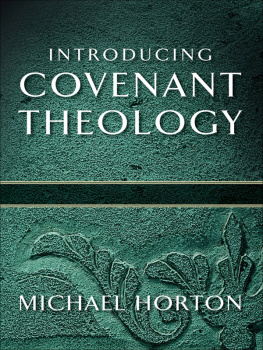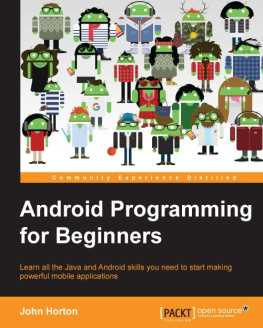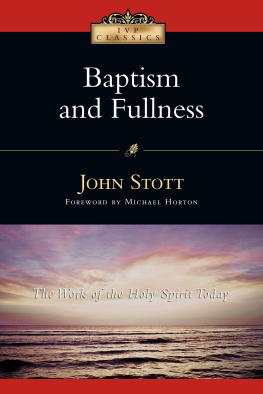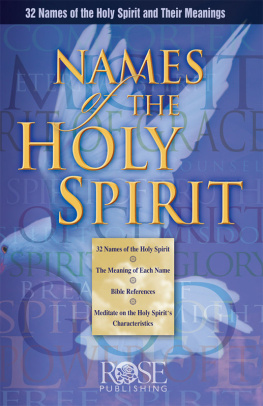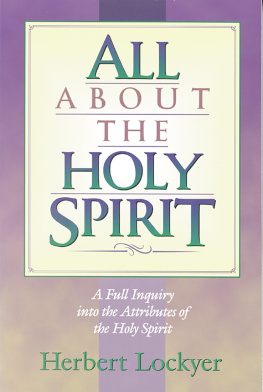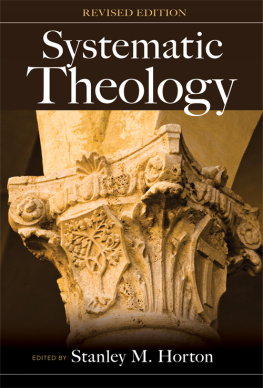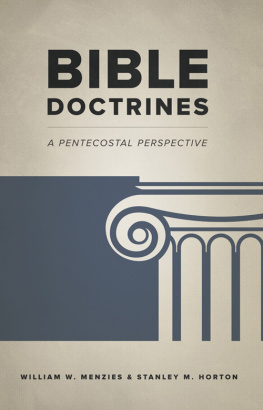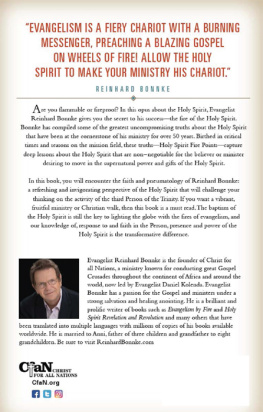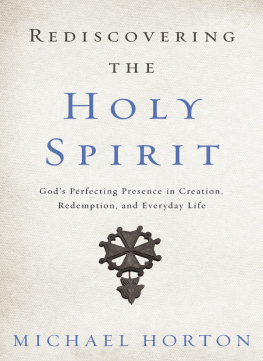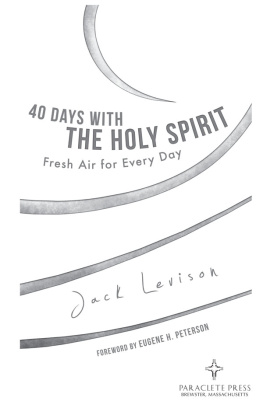REVISED EDITION
Systematic
Theology
EDITED BY
Stanley M. Horton

Springfield, Missouri
All Scripture quotations, unless otherwise indicated, are taken from the HOLY BIBLE, NEW INTERNATIONAL VERSION, NIV. Copyright 1973, 1978, 1984 by International Bible Society. Used by permission of Zondervan. All rights reserved.
Scripture quotations marked NCVTM are taken from the New Century Version. Copyright 1987, 1988, 1991 by Thomas Nelson, Inc. Used by permission. All rights reserved.
Scripture quotations marked (KJV) are taken from the King James Version of the Bible.
1994, 1995, 2007 by Gospel Publishing House, 1445 N. Boonville Ave., Springfield, Missouri 65802. All rights reserved. No part of this book may be reproduced, stored in a retrieval system, or transmitted in any form or by any meanselectronic, mechanical, photocopy, recording, or otherwisewithout prior written permission of the copyright owner, except brief quotations used in connection with reviews in magazines or newspapers.
Logion Press books are published by Gospel Publishing House.
ISBN: 978-1-60731-122-5
Printed in the United States of America
Contents
List of Contributors
Benny C. Aker, Ph.D., Professor of New Testament and Exegesis at Assemblies of God Theological Seminary
Carolyn Denise Baker, M.Div., Instructor in Bible and Theology at American Indian Bible College and National Appointed Home Missionary
Michael L. Dusing, D.Min., Professor and Department Chair, Theology and Philosophy at Southeastern College of the Assemblies of God
John R. Higgins, Th.D., Educator, Missionary to India
Stanley M. Horton, Th.D., Distinguished Professor Emeritus of Bible and Theology at Assemblies of God Theological Seminary
Timothy P. Jenney, Ph.D., Associate Professor of Pastoral Ministries at North Central Bible College
Russell Joyner, MATS, Associate Pastor of West End Assembly of God, Richmond, Virginia
Byron D. Klaus, D.Min., Professor of Church Leadership at Southern California College
David Lim, D.Min., Senior Pastor of Grace Assembly of God in Singapore
Frank D. Macchia, Th.D., Associate Professor of Theology at Southeastern College of the Assemblies of God
Bruce R. Marino, Ph.D., Assistant Professor of Bible and Theology at Valley Forge Christian College
Gary B. McGee, Ph.D., Professor of Church History, Chair, Bible and Theology Department at Assemblies of God Theological Seminary
Mark D. McLean, Ph.D., Professor of Biblical Studies at Evangel College
Kerry D. McRoberts, M.A., M.C.S., Assistant Professor of Bible and Theology at Trinity Bible College
Timothy Munyon, M.A., Assistant Professor of Biblical Studies and Greek at Trinity Bible College
David R. Nichols, Ph.D., Associate Professor of Pastoral Studies at North Central Bible College
Daniel B. Pecota, D.Min., Professor of Theology, Greek, and Bible, Divisional Coordinator for Religious and Ministerial Studies at Northwest College of the Assemblies of God
Vernon Purdy, Ph.D. Candidate, Assistant Professor in Bible, Central Bible College
James H. Railey, Jr., Ph.D., Candidate, Associate Professor of Practical Theology at Assemblies of God Theological Seminary
John W. Wyckoff, Ph.D., Professor of Bible and Theology, Chair, Church Ministries Division at Southwestern Assemblies of God College
Preface
During the early centuries of the history of the Church, many stated their faith in letters, creeds, and confessions. These theological affirmations were used in the worship and in the defense of the faith. So it is to this day: The Church continues to affirm its faith in the revelation of God in Christ through the ongoing work of theological writing and dialogue.
This present volume comes from the Pentecostal community of faith and is the work of teachers of Bible and theology in the seminary and colleges of the Assemblies of God. It is a statement that the work of theology is valued and approached seriously and earnestly in the Pentecostal branch of the Church.
The first intended audience for this book is the students at the institutions represented by the authors. They deserve to read theology from the perspectives of teachers within the educational community in which they are studying. The clergy of the Assemblies of God and other Pentecostal fellowships, too, should have the privilege of a theological presentation that is in keeping with the faith they have received and are passing on to the congregations they serve. Local church members will also profit from reading this biblical affirmation of faith. Other churches and denominations can receive benefit as well, for most of the truths defended in this work are also held by all Bible believers.
I wish to thank Dr. G. Raymond Carlson, general superintendent of the Assemblies of God (198593); the Assemblies of God Theological Seminary; Central Bible College; Berean College; the Postsecondary Education Department of the Assemblies of God; the Division of Foreign Missions of the Assemblies of God; and others who have made this project possible. Special thanks are due to Dr. Edgar Lee, Dr. Elmer Kirsch, Dr. Zenas Bicket, and Rev. David Bundrick, who have read the manuscripts and made many helpful suggestions. Special thanks also are due to Glen Ellard and his editorial staff for their expert help.
In line with the usage of both the KJV and the NIV, LORD is used in capitals and small capitals where the Hebrew of the Old Testament has the personal, divine name of God, Yahweh (which was probably pronounced ya-wa).
In quoted Scripture, words the authors wish to emphasize are in italics.
For easier reading, Hebrew, Aramaic, and Greek words are all transliterated with English letters.
These abbreviations have been used:
| AV: | Authorized Version |
| BDB: | New Brown-Driver-Briggs Gesenius Hebrew and English Lexicon |
| DPCM: | Dictionary of Pentecostal and Charismatic Movements |
| Ger.: | German |
| Gk.: | Greek |
| Heb.: | Hebrew |
| KJV: | King James Version |
| Lat.: | Latin |
| NASB: | New American Standard Bible |
| NCV: | New Century Version |
| NEB: | The New English Bible |
| NIV: | New International Version |
| NKJV: | New King James Version |
| NRS: | New Revised Standard Version |
| RSV: | Revised Standard Version |
STANLEY M. HORTON
GENERAL EDITOR
The Hebrew wrote only the consonants YHWH . Later traditions followed the New Latin JHVH and added vowels from the Hebrew for Lord to remind them to read Lord instead of the divine name. But this was never intended to be read Jehovah.
CHAPTER ONE
Historical Background
Gary B. McGee
Someone once remarked that Pentecostalism is an experience looking for a theology, as if the movement lacked roots in biblical interpretation and Christian doctrine. Research on the historical and theological development of Pentecostal beliefs, however, has revealed a complex theological tradition. It bears strong commonalities with evangelical doctrines while testifying to long-neglected truths about the work of the Holy Spirit in the life and mission of the Church.
Beginning with the theological background of Pentecostalism, this chapter then focuses on the growth of Assemblies of God theology since the organizations founding in 1914. Factors considered include paramount concerns, influential personalities, significant literature, and various means employed to preserve doctrine.


